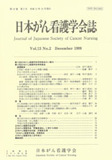Japanese
English
- 販売していません
- Abstract 文献概要
- 参考文献 Reference
- サイト内被引用 Cited by
要約
本研究の目的は,放射線治療中の癌患者の倦怠感をアセスメントし,倦怠感の出現の有無・程度・パターンを明らかにすること,また倦怠感と精神的要因との関連性を検討することである.調査対象者は,これから放射線治療を受ける癌患者35名で,放射線治療をはじめる週を第1週としてその後各週に1回,計4週間にわたって経時的に倦怠感の測定とその関連要因に関して面接調査と参加観察を行った.さらに,対照群として,放射線未治療者30名の倦怠感を測定し,対象群と比較検討した.倦怠感の測定に米国で開発された倦怠感尺度Piper Fatigue Scale(PFS)を邦訳して使用し,その他にも2種類の倦怠感尺度を用いた.その結果,以下の知見が得られた.
1.本研究において邦訳した倦怠感尺度PFSの信頼性と妥当性が確認され,癌患者の倦怠感には,行動,情緒,知覚,認知の4つの側面が深く関与していることが示唆された.
2.放射線治療中の癌患者の倦怠感は放射線治療をはじめて第1 週目は倦怠感の出現はほとんどないが第2週目から第4週目にかけて倦怠感が上昇し,第4週にピークに達した.対象者の86%に軽度から重度の倦怠感の出現が見られた.
3.倦怠感が強いと感情障害や抑鬱傾向も強く,倦怠感と精神的要因との関連性が示唆された.
以上より,放射線治療中の癌患者の倦怠感の出現パターンおよび精神的要因との関連性が明らかになり,それを考慮に入れた倦怠感の定期的アセスメントおよび精神的サポートを含めた看護援助の重要性が示唆された.
Abstract
The purpose of this study was to assess and identify the prevalence of fatigue, severity level of fatigue and pattern of fatigue, to determine the relationship between fatigue and psychological factors thought to influence fatigue. Thirty-five cancer patients who were treated with localized radiation for the first time were surveyed by interview and participant observation in each week for 4 weeks. Thirty cancer patients who had never had radiotherapy were selected for the control group. The Piper Fatigue Scale (PFS was translated into Japanese)and two other fatigue scales were used for measuring fatigue.
The main results were as follows:
1. The PFS was identified reliability and validity. It was suggested that cancer related fatigue was associated with 4 dimensions of fatigue : behavior, affective, sensory and cognitive.
2. Cancer patients experienced a significant increase in fatigue through the 2nd to the 4th week of radiotherapy and the highest fatigue level was found in the 4th week of treatment. Eighty-six percent of cancer patients were experiencing mild to severe levels of fatigue in the 4th week of treatment.
3. Psychological distress(mood disturbance and depressive symptom) was associated with fatigue levels in the 3rd and 4th week of treatment.
These findings suggest that localized radiation treatment is associated with increased fatigue, symptoms of distress and psychological factors. By understanding these factors that relate to fatigue, nurses can plan interventions aimed at decreasing fatigue or helping the patient to live with fatigue.
Copyright © 1999, Japanese Society of Cancer Nursing All rights reserved.


